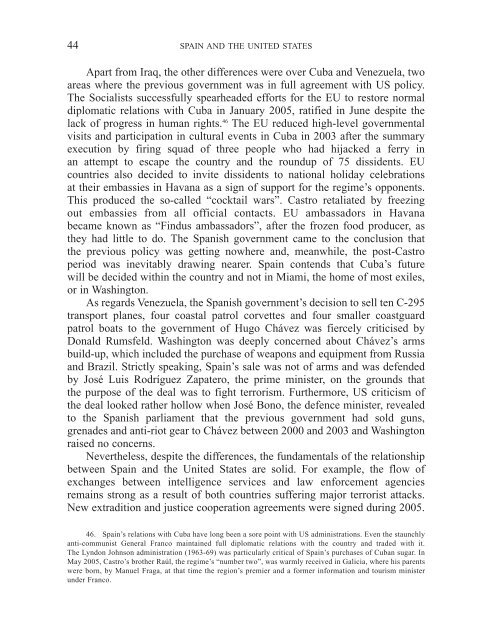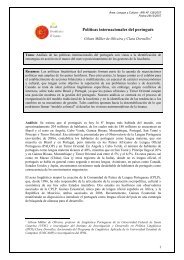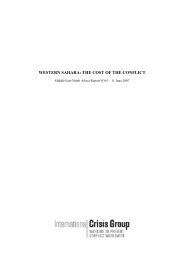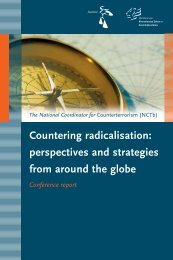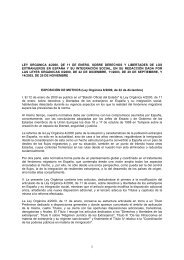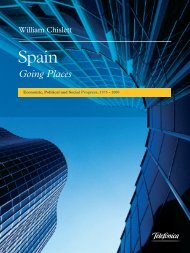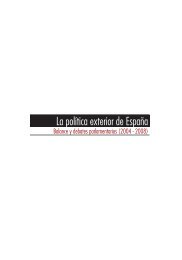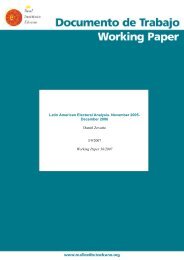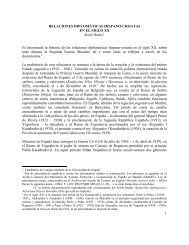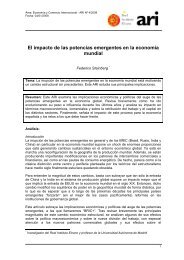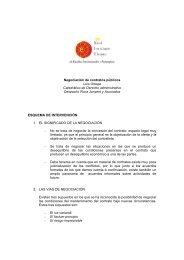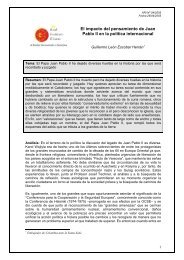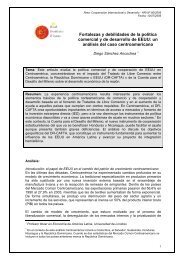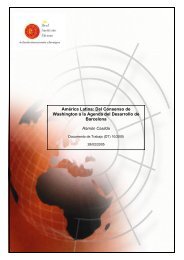Spain and the United States - Real Instituto Elcano
Spain and the United States - Real Instituto Elcano
Spain and the United States - Real Instituto Elcano
Create successful ePaper yourself
Turn your PDF publications into a flip-book with our unique Google optimized e-Paper software.
44<br />
SPAIN AND THE UNITED STATES<br />
Apart from Iraq, <strong>the</strong> o<strong>the</strong>r differences were over Cuba <strong>and</strong> Venezuela, two<br />
areas where <strong>the</strong> previous government was in full agreement with US policy.<br />
The Socialists successfully spearheaded efforts for <strong>the</strong> EU to restore normal<br />
diplomatic relations with Cuba in January 2005, ratified in June despite <strong>the</strong><br />
lack of progress in human rights. 46 The EU reduced high-level governmental<br />
visits <strong>and</strong> participation in cultural events in Cuba in 2003 after <strong>the</strong> summary<br />
execution by firing squad of three people who had hijacked a ferry in<br />
an attempt to escape <strong>the</strong> country <strong>and</strong> <strong>the</strong> roundup of 75 dissidents. EU<br />
countries also decided to invite dissidents to national holiday celebrations<br />
at <strong>the</strong>ir embassies in Havana as a sign of support for <strong>the</strong> regime’s opponents.<br />
This produced <strong>the</strong> so-called “cocktail wars”. Castro retaliated by freezing<br />
out embassies from all official contacts. EU ambassadors in Havana<br />
became known as “Findus ambassadors”, after <strong>the</strong> frozen food producer, as<br />
<strong>the</strong>y had little to do. The Spanish government came to <strong>the</strong> conclusion that<br />
<strong>the</strong> previous policy was getting nowhere <strong>and</strong>, meanwhile, <strong>the</strong> post-Castro<br />
period was inevitably drawing nearer. <strong>Spain</strong> contends that Cuba’s future<br />
will be decided within <strong>the</strong> country <strong>and</strong> not in Miami, <strong>the</strong> home of most exiles,<br />
or in Washington.<br />
As regards Venezuela, <strong>the</strong> Spanish government’s decision to sell ten C-295<br />
transport planes, four coastal patrol corvettes <strong>and</strong> four smaller coastguard<br />
patrol boats to <strong>the</strong> government of Hugo Chávez was fiercely criticised by<br />
Donald Rumsfeld. Washington was deeply concerned about Chávez’s arms<br />
build-up, which included <strong>the</strong> purchase of weapons <strong>and</strong> equipment from Russia<br />
<strong>and</strong> Brazil. Strictly speaking, <strong>Spain</strong>’s sale was not of arms <strong>and</strong> was defended<br />
by José Luis Rodríguez Zapatero, <strong>the</strong> prime minister, on <strong>the</strong> grounds that<br />
<strong>the</strong> purpose of <strong>the</strong> deal was to fight terrorism. Fur<strong>the</strong>rmore, US criticism of<br />
<strong>the</strong> deal looked ra<strong>the</strong>r hollow when José Bono, <strong>the</strong> defence minister, revealed<br />
to <strong>the</strong> Spanish parliament that <strong>the</strong> previous government had sold guns,<br />
grenades <strong>and</strong> anti-riot gear to Chávez between 2000 <strong>and</strong> 2003 <strong>and</strong> Washington<br />
raised no concerns.<br />
Never<strong>the</strong>less, despite <strong>the</strong> differences, <strong>the</strong> fundamentals of <strong>the</strong> relationship<br />
between <strong>Spain</strong> <strong>and</strong> <strong>the</strong> <strong>United</strong> <strong>States</strong> are solid. For example, <strong>the</strong> flow of<br />
exchanges between intelligence services <strong>and</strong> law enforcement agencies<br />
remains strong as a result of both countries suffering major terrorist attacks.<br />
New extradition <strong>and</strong> justice cooperation agreements were signed during 2005.<br />
46. <strong>Spain</strong>’s relations with Cuba have long been a sore point with US administrations. Even <strong>the</strong> staunchly<br />
anti-communist General Franco maintained full diplomatic relations with <strong>the</strong> country <strong>and</strong> traded with it.<br />
The Lyndon Johnson administration (1963-69) was particularly critical of <strong>Spain</strong>’s purchases of Cuban sugar. In<br />
May 2005, Castro’s bro<strong>the</strong>r Raúl, <strong>the</strong> regime’s “number two”, was warmly received in Galicia, where his parents<br />
were born, by Manuel Fraga, at that time <strong>the</strong> region’s premier <strong>and</strong> a former information <strong>and</strong> tourism minister<br />
under Franco.


